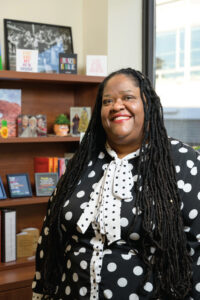Yvette Young ’98

DEGREES: B.S. in psychology; M.Ed. in counseling psychology, Cambridge College
JOB TITLE: Associate vice president of training and advocacy, The Village for Families & Children in Hartford, Connecticut
FAVORITE TRINITY MEMORY: One of my most cherished memories at Trinity is volunteering for Cinestudio. As a passionate movie lover, my time at Cinestudio solidified this aspect of my personality. While many of my peers attended weekend parties, I found joy in selling tickets and welcoming guests at Cinestudio’s showings. I loved every moment of that experience, and the eclectic array of films broadened my perspective. Cinestudio was my moment of Zen—an artistic sanctuary that enriched my college experience. Though I may not recall the names of all of my professors or the courses I took, I will forever cherish the impact that Cinestudio had on this movie geek.
What was your path to Trinity and beyond?
My journey to Trinity began with my migration to the United States from the beautiful Island of Jamaica. My parents came here in the ’80s looking for a better opportunity for themselves and their three children. My mom was working here to get enough funds for our family to join her, and in 1984, she sent for me; I was the youngest child, and she was anxious about me being cared for by others. We lived in Hartford for several years before my parents bought a home in nearby Bloomfield. My story is one of an immigrant Black girl who came to America and became the manifestation of her parents’ dream, which was to see us have opportunities beyond what they had or would be able to provide us in Jamaica. I was a good student and graduated in the top five of my high school class. As a result, I had endless opportunities of where I could go to college, and my choice was Trinity. After an exceptional undergraduate education and the ability to study abroad in England for a semester, I obtained my master’s degree in counseling psychology. I have worked in the nonprofit behavioral health sector for more than 20 years.
What do you do in your current role?
I provide leadership oversight for our training department, our Juvenile Review Board, and our contract for the Governor’s Task Force on Justice for Abused Children, and I am a member or co-chair of several statewide committees and advisory councils whose work focuses on human trafficking, racial justice, mental health, health equity, and criminal justice. After many years working as a clinician and a program director, I gained a great deal of insight about our various service systems and the impact poverty, mental health, and racism has on the lives of those I serve.
What do you enjoy most about your work?
I enjoy advocating for equity. I have an opportunity to bring awareness about disparities that exist in all of our state systems and communities. I have a seat at many committee tables where there are discussions and planning for how to create more equitable outcomes for all, and that excites me. I want to be a change agent, and in my current role, I have the opportunity to live out that dream.
What is the biggest challenge you face in your work?
Funding is always a major barrier and a point of conversation at every meeting. In a Trinity sociology class, the professor used an analogy of a pie to explain how people fight for resources to meet their needs. He said that there is a whole pie; some entities will get big pieces, some will get one slice, and some will fight over the crumbs. This resonated with me. When it comes to securing funding, most days it feels like we are fighting for the crumbs rather than looking at what slices may be left in the pie or how the pie can be served more equitably.
How did Trinity prepare you for your career?
Trinity taught me how to be a critical thinker and problem solver, and those skills have been essential in my success to date. I am blessed to have the opportunity to advocate for what is right and just, for those who need to be seen, and for systems that will heal and not perpetuate harm. It is not an easy fight but a necessary one. I aspire to be a change agent, an individual who will leave this place a better one for the generations behind me. I want all people to have the opportunity to live to their full potential without limits. Trinity also taught me to be a feminist, an abolitionist, a warrior, a justice seeker, and a healer. I found myself at college because of the exposure my liberal arts education provided.
